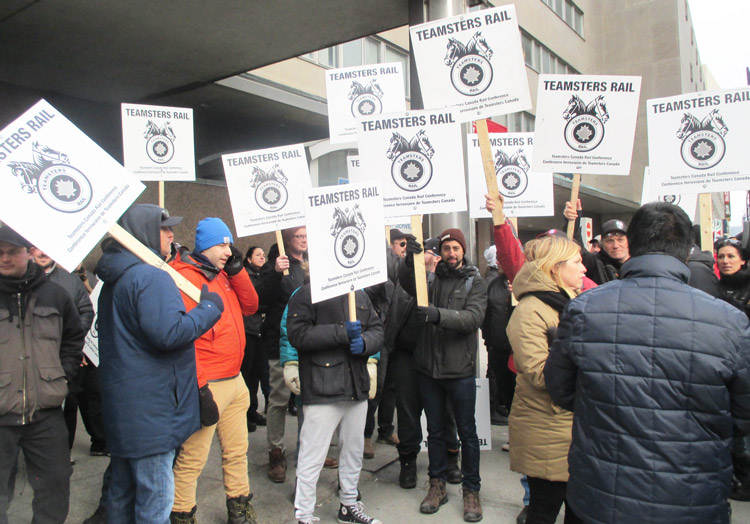MONTREAL — Following a Nov. 26 tentative agreement between Teamsters Canada Rail Conference officials and Canadian National Railway bosses, the 3,200 CN conductors, including yardmen and yardmasters, returned to work Nov. 27 after an eight-day “strike for safety.” The workers will meet to debate the proposal over the next few weeks and vote in the weeks after.
The strike won wide support among working people, many of whom face similar attacks from bosses on working conditions, hours and schedules.
CN supervisors managed to run a few trains, but fuel, wheat, fertilizer and manufactured goods largely remained sitting idle in rail cars and warehouses.
Bosses in oil, mining, chemicals and other industries, backed by a compliant big-business press, set up a howl of protest. They demanded the government order an end to the strike, which Ottawa has done in past rail strikes. They hoped their demand would get an echo from workers who faced layoffs from the strike. In Saskatchewan over 500 potash miners were laid off Dec. 2 when Nutrien bosses said they had too much inventory on hand.
But parliament wasn’t in session, and the minority Liberal-government of Prime Minister Justin Trudeau decided not to call legislators back, due in part to the strike’s popularity.
Many farmers were affected by the strike. Some protested outside CN’s headquarters in Montreal, demanding the rail bosses get them propane, needed to keep animals warm and to dry crops at harvest. CN had plenty of tank cars loaded with propane, but hadn’t taken steps to deliver the gas to farmers, hoping they would turn against the strike.
When some rail workers and their supporters — including members of the Communist League — went to farmers’ protests and then visited farm to farm, they found many farmers were responsive to the aims of the strike.
Widespread support
The strike began Nov. 19 after workers voted to take on the profit-driven move by CN bosses to cut crew size, reduce rest periods, and other demands that would increase the likelihood of derailments, injuries and deaths.
During the strike workers adapted the generic printed Teamsters union picket signs with handwritten slogans like “I’m tired of being tired” and “Rail workers lives matter.” They explained the dangers both they and working people living in the vicinity of railway tracks face from the inevitable consequences of the bosses’ disdain for safety.
The memory of the 2013 Lac-Mégantic oil train disaster in Quebec was an important factor in the broad support for the strike.
Millions of working people across the country know that the causes of that derailment and fire, which killed 47 people and destroyed the town center, are the same profit-driven cost-cutting policies now risking the lives and limbs of the CN workers.
This was reinforced both by the official report of the Transportation Safety Board on the disaster and by the popular verdict finding union train crew members Tom Harding and Richard Labrie not guilty in the 2018 frame-up trial when rail bosses and the government tried to pin the blame for the derailment on them.
On the final day of the strike this Militant worker-correspondent distributed a well-received press release from the Coalition and Organizations Committed to Rail Safety in Lac-Mégantic declaring they were “eager to give its full support to CN Rail workers who are currently struggling to improve their working conditions.”
Bosses disregard for workers’ safety
“There are no small consequences with a train,” Jean-Gabriel Besner-Richer, a CN worker, told the online La Presse while picketing at CN headquarters in downtown Montreal Nov. 26. “There is the risk of injury and deaths when a locomotive engineer is tired.”
Other workers agreed. “I am here because it is important for other workers to come to support the conductors. They are fighting for big stakes, like health and safety,” Walmart worker Pierre-Luc Filion, who came to the picket line to show support, told La Presse.
Rail workers in the U.S. who face the same push by the bosses to cut crews and safety followed the strike closely. Solidarity messages were hand delivered to strikers from rail workers in Chicago and in a card sent by BLET Division 226 in the New York/New Jersey/Pennsylvania region signed by 25 engineers, conductors and van drivers.
The day before the agreement Teamsters union officials made public a 2018 tape recording of a CN supervisor ordering a conductor, who has 30-years’ experience, to move his train through a residential area east of Toronto despite the fact that he says repeatedly that after almost 11 hours of work he and his engineer are “exhausted” and need to be relieved. The tape was played repeatedly on television, written up in the print media and spread all over social media.
“My engineer is exhausted. I’m exhausted. I’ve told you we’re exhausted right from the get go,” the conductor tells the supervisor. “If I take this train out now and we hit somebody, who is responsible for that now? Me or you?” The conductor didn’t move the train and was suspended for 14 days without pay.
Now the contract proposal is in the hands of CN workers to debate and decide.


